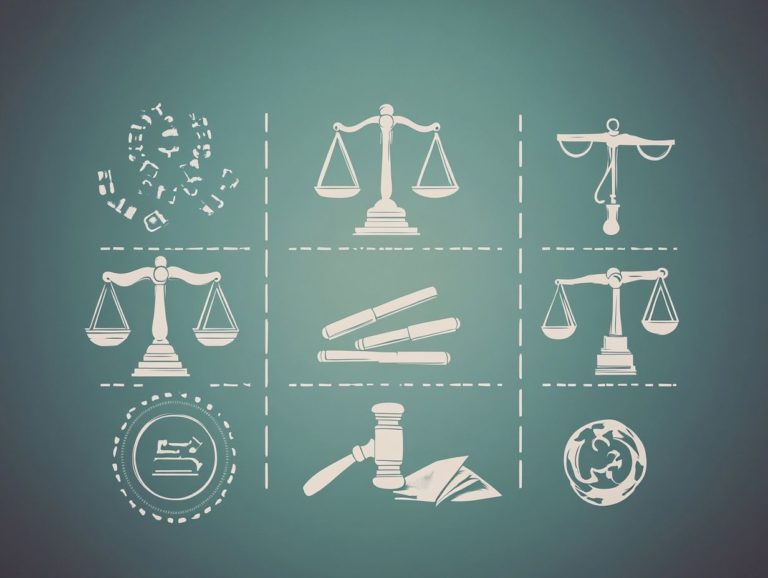Understanding Assault and Battery Crimes
Assault and battery are terms frequently used interchangeably. However, they signify distinct legal concepts, each carrying serious implications.
This exploration delves into the definitions and differences between these two offenses. It examines various types, ranging from verbal and physical to sexual assaults. It outlines the legal consequences that offenders may encounter.
It also explains how these crimes are proven in court and discusses potential defenses that might be employed. Additionally, practical tips for conflict prevention will be provided.
Prepare to unravel the complexities of assault and battery, gaining essential insights that can help you comprehend these critical issues.
Contents
Key Takeaways:
Assault and battery are two distinct but related crimes that involve physical harm or the threat of physical harm.
Assault and battery can take various forms, including verbal, physical, and sexual actions.
The legal consequences for assault and battery can result in charges and penalties, which can be proven in court with the required elements of proof.
What is Assault and Battery?
Assault and battery are two distinct yet interconnected criminal offenses. They can vary greatly depending on state law, including jurisdictions such as Florida, Illinois, Texas, and California.
Assault primarily encompasses the unlawful threat of physical harm. In contrast, battery involves actual physical contact that results in injury. Grasping the nuances between these offenses is vital for anyone facing charges.
The legal definitions often depend on factors such as the presence of fear, the immediacy of danger, and the extent of physical contact involved. This complexity highlights why hiring a good lawyer is crucial for navigating these serious allegations effectively.
Definitions and Differences
The definitions of assault and battery are fundamentally distinct. Assault revolves around the threat of harm, while battery involves actual physical contact.
In legal terminology, assault is recognized as an action that instills a reasonable apprehension of imminent harm in another person. This embodies the victim s fear of potential violence. For instance, if someone raises a fist in a threatening way, that can be classified as assault, even if no physical contact is made.
On the other hand, battery necessitates the application of actual force. This might involve pushing or striking another individual.
It s essential to grasp that while both offenses fall under the umbrella of personal injury, the key difference is that assault involves threats, while battery involves actual contact. Understanding these distinctions unveils the complexities within the legal framework governing these two terms.
Types of Assault and Battery
You should be aware that assault and battery come in several forms verbal, physical, and sexual each with distinct legal consequences.
The potential penalties for these offenses can vary significantly depending on the jurisdiction. Understanding the nuances is essential.
Verbal, Physical, and Sexual
Verbal, physical, and sexual assaults represent distinct categories of assault and battery, each with its own nature and severity. They present unique legal challenges and consequences for you to navigate.
Verbal assault typically involves threats or intimidation expressed through words. It often leaves deep emotional scars that can be difficult to substantiate in court.
Physical assault entails actions that result in harm or the threat of harm. Legal repercussions vary based on the severity of the injuries inflicted.
Sexual assault encompasses any non-consensual sexual act. The penalties for this crime reflect society’s acknowledgment of its profound impact on victims’ lives.
The emotional toll from these violations can be as damaging as any physical injury sustained. This underscores the urgent need to address these serious offenses within the legal framework.
Legal Consequences of Assault and Battery
The legal repercussions of assault and battery can vary widely. They encompass everything from misdemeanor charges to aggravated felonies.
The penalties you might face will depend significantly on the particulars of the offense and the state where it occurred.
Possible Charges and Penalties
Possible charges for assault and battery encompass a range of classifications, including aggravated assault, simple assault, and battery. Each of these comes with its own unique set of penalties, which can vary from fines to imprisonment.
The classification of these charges often hinges on the severity of the act, the intent behind it, and whether any injuries were inflicted. Aggravated assault typically involves the use of a weapon or a clear intent to cause serious harm. This results in more severe penalties.
Simple assault might arise from threats or minor injuries, leading to less dire consequences.
A lawyer plays a critical role in these scenarios. They will help you navigate the details of legal defenses, construct a solid argument, and work diligently to reduce charges. It s important to remember that repercussions can differ significantly from one state to another. Expert legal guidance is essential.
Proving Assault and Battery in Court
Establishing assault and battery in court requires that you demonstrate particular elements of proof. The prosecutor must effectively present these to secure a conviction against the defendant.
Each component plays a crucial role in building a compelling case that stands up to scrutiny.
Required Elements of Proof
The essential elements of proof for assault and battery typically include intent, threat, physical contact, and resulting injury or harm. Understanding these components is crucial as you build a robust legal case.
Intent refers to the desire to cause harm. Even a reasonable belief of impending danger can suffice for an assault claim. The threat must be credible and instill genuine fear in the victim.
Battery relies on actual physical contact that can result in injury, whether minor or severe. To substantiate your claims, you must show that the injury or harm directly resulted from the defendant’s actions.
Defenses against these allegations may include consent, where the victim knowingly accepted the risk of harm, or self-defense, asserting that the accused acted to protect themselves or others from imminent danger.
Each of these elements plays a vital role in shaping how a legal case is perceived in court.
Defenses for Assault and Battery
Defenses for assault and battery can include self-defense, justifications, or various other excuses that may lessen the defendant s responsibility in the eyes of the law.
Understanding these defenses is crucial, as they can significantly impact the case outcome and alter perceptions of guilt or innocence.
Justifications and Excuses

Justifications and excuses in assault and battery cases often revolve around claims of self-defense or the necessity to prevent greater harm. These legal concepts highlight the intricate distinctions between permissible actions in self-defense and those that may be unjustified or excessive.
Different jurisdictions impose varying standards, weighing factors such as the immediacy of the threat and the proportionality of the response.
Some states adhere to a ‘reasonable person’ standard, assessing actions based on how an average individual would react in similar circumstances. Others may invoke a ‘duty to retreat’ rule, necessitating individuals to avoid conflict whenever possible before resorting to force.
You must understand these nuances as you navigate the complex landscape of legal defenses in assault and battery allegations.
Preventing Assault and Battery
Preventing assault and battery is crucial for cultivating a secure community. Your safety matters!
There are several effective strategies you can use to avoid conflict and de-escalate potentially dangerous situations.
Tips for Avoiding and De-escalating Conflict
To effectively avoid and de-escalate conflict, focus on active listening, maintaining a calm demeanor, and recognizing the triggers that may lead others to aggressive behavior.
Being aware of your own body language is crucial. Adopting an open posture and maintaining eye contact can communicate empathy and sincerity. Practice situational awareness to enhance your interactions by being aware of what’s happening around you.
Using non-confrontational language can help diffuse potential tensions and pave the way for constructive dialogue.
Creating an atmosphere of trust establishes mutual respect, making it easier to address disagreements without letting the situation escalate. Mastering these skills not only aids in resolving conflicts but also nurtures healthier interpersonal relationships!
Check out this helpful video on conflict resolution:
Frequently Asked Questions
What are assault and battery crimes?
Assault and battery crimes refer to violent acts against another person that can result in physical harm or offensive contact.
What is the difference between assault and battery?

Assault is the threat of violence, while battery is the actual physical contact or harm. Both can be charged as separate crimes, but assault is typically considered a lesser offense.
What are the different types of assault and battery crimes?
- Simple assault
- Aggravated assault
- Sexual assault
- Domestic violence
Each type has different elements and penalties.
How are assault and battery crimes punished?
The severity of the punishment depends on the specific crime and the circumstances surrounding it. Penalties can range from fines and probation to imprisonment.
Can assault and battery charges be dropped?
In some cases, assault and battery charges can be dropped or reduced through a plea deal or lack of evidence. It is important to consult with a lawyer to understand the options in your specific case.
What should I do if I have been charged with assault or battery?
If you have been charged with assault or battery, seek legal representation immediately. A skilled lawyer can help you build a strong defense and protect your rights throughout the legal process.
Understanding assault and battery crimes is crucial! If you find yourself facing such charges, remember that having legal assistance can greatly impact the outcome of your case.








